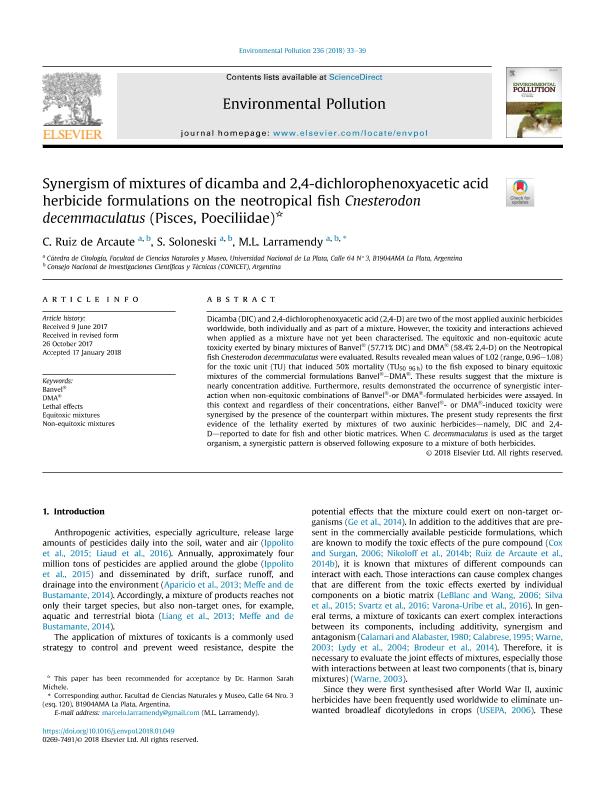Mostrar el registro sencillo del ítem
dc.contributor.author
Ruiz de Arcaute, Celeste

dc.contributor.author
Soloneski, Sonia Maria Elsa

dc.contributor.author
Larramendy, Marcelo Luis

dc.date.available
2020-03-16T21:00:41Z
dc.date.issued
2018-05
dc.identifier.citation
Ruiz de Arcaute, Celeste; Soloneski, Sonia Maria Elsa; Larramendy, Marcelo Luis; Synergism of mixtures of dicamba and 2,4-dichlorophenoxyacetic acid herbicide formulations on the neotropical fish Cnesterodon decemmaculatus (Pisces, Poeciliidae); Elsevier; Environmental Pollution; 236; 5-2018; 33-39
dc.identifier.issn
0269-7491
dc.identifier.uri
http://hdl.handle.net/11336/99705
dc.description.abstract
Dicamba (DIC) and 2,4-dichlorophenoxyacetic acid (2,4-D) are two of the most applied auxinic herbicides worldwide, both individually and as part of a mixture. However, the toxicity and interactions achieved when applied as a mixture have not yet been characterised. The equitoxic and non-equitoxic acute toxicity exerted by binary mixtures of Banvel® (57.71% DIC) and DMA® (58.4% 2,4-D) on the Neotropical fish Cnesterodon decemmaculatus were evaluated. Results revealed mean values of 1.02 (range, 0.96–1.08) for the toxic unit (TU) that induced 50% mortality (TU50 96 h) to the fish exposed to binary equitoxic mixtures of the commercial formulations Banvel®–DMA®. These results suggest that the mixture is nearly concentration additive. Furthermore, results demonstrated the occurrence of synergistic interaction when non-equitoxic combinations of Banvel®-or DMA®-formulated herbicides were assayed. In this context and regardless of their concentrations, either Banvel®- or DMA®-induced toxicity were synergised by the presence of the counterpart within mixtures. The present study represents the first evidence of the lethality exerted by mixtures of two auxinic herbicides—namely, DIC and 2,4-D—reported to date for fish and other biotic matrices. When C. decemmaculatus is used as the target organism, a synergistic pattern is observed following exposure to a mixture of both herbicides. Synergic effects of equitoxic and non-equitoxic mixtures of auxinic herbicides in C. decemmaculatus.
dc.format
application/pdf
dc.language.iso
eng
dc.publisher
Elsevier

dc.rights
info:eu-repo/semantics/openAccess
dc.rights.uri
https://creativecommons.org/licenses/by-nc-sa/2.5/ar/
dc.subject
BANVEL®
dc.subject
DMA®
dc.subject
EQUITOXIC MIXTURES
dc.subject
LETHAL EFFECTS
dc.subject
NON-EQUITOXIC MIXTURES
dc.subject.classification
Biología Celular, Microbiología

dc.subject.classification
Ciencias Biológicas

dc.subject.classification
CIENCIAS NATURALES Y EXACTAS

dc.title
Synergism of mixtures of dicamba and 2,4-dichlorophenoxyacetic acid herbicide formulations on the neotropical fish Cnesterodon decemmaculatus (Pisces, Poeciliidae)
dc.type
info:eu-repo/semantics/article
dc.type
info:ar-repo/semantics/artículo
dc.type
info:eu-repo/semantics/publishedVersion
dc.date.updated
2020-02-20T15:13:32Z
dc.journal.volume
236
dc.journal.pagination
33-39
dc.journal.pais
Países Bajos

dc.journal.ciudad
Amsterdam
dc.description.fil
Fil: Ruiz de Arcaute, Celeste. Consejo Nacional de Investigaciones Científicas y Técnicas; Argentina. Universidad Nacional de La Plata. Facultad de Ciencias Naturales y Museo. Cátedra de Citología; Argentina
dc.description.fil
Fil: Soloneski, Sonia Maria Elsa. Universidad Nacional de La Plata. Facultad de Ciencias Naturales y Museo. Cátedra de Citología; Argentina. Consejo Nacional de Investigaciones Científicas y Técnicas; Argentina
dc.description.fil
Fil: Larramendy, Marcelo Luis. Universidad Nacional de La Plata. Facultad de Ciencias Naturales y Museo. Cátedra de Citología; Argentina. Consejo Nacional de Investigaciones Científicas y Técnicas; Argentina
dc.journal.title
Environmental Pollution

dc.relation.alternativeid
info:eu-repo/semantics/altIdentifier/url/https://www.sciencedirect.com/science/article/pii/S0269749117324570
dc.relation.alternativeid
info:eu-repo/semantics/altIdentifier/doi/http://dx.doi.org/10.1016/j.envpol.2018.01.049
Archivos asociados
